
Welcome to the ultimate guide to bodybuilding supplements.
If you've ever felt overwhelmed by the vast array of supplements on the market, this will help you.
It's a complex world, with countless products promising to help you build muscle, increase strength, and enhance your performance.
But where do you start?
What supplements are truly effective, and which ones are just hype?
This guide is here to help you navigate the supplement category, providing you with the information you need to make informed decisions about your bodybuilding supplement regimen.
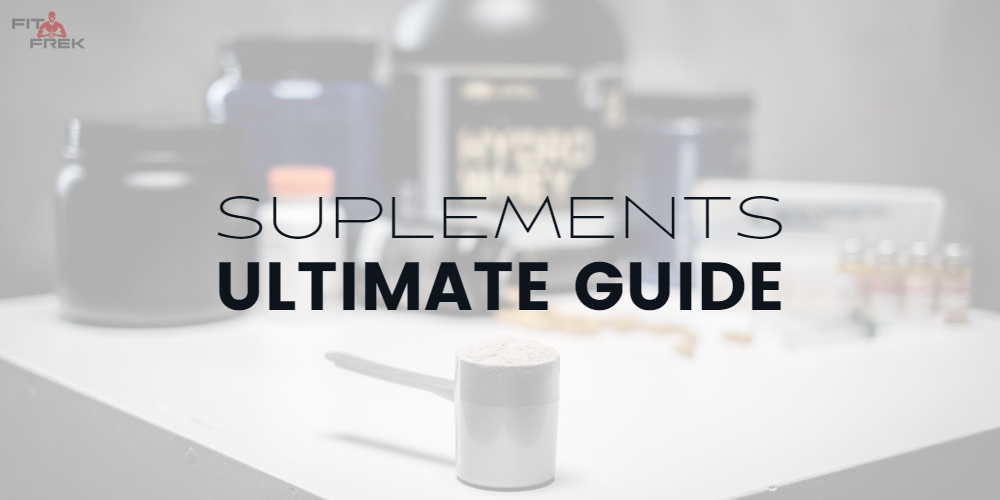
In the bodybuilding world, supplements can be the edge you're looking for.
However, it's important to remember that not all supplements are equal.
For beginners, the most proven supplements are creatine and whey protein.
Recommended Resources:
With over a thousand studies backing their effectiveness, these two supplements are a great starting point for anyone new to bodybuilding.
Here's what we'll cover in this bodybuilding supplement guide:
Understanding Bodybuilding Supplements: Bodybuilding supplements are products designed to enhance an individual's diet and improve workout results. They can include a variety of ingredients, from proteins and amino acids to vitamins and minerals.
The Importance of Supplements in Bodybuilding: Supplements can provide the necessary nutrients that might be lacking in your diet, aid in muscle recovery and growth, and enhance your performance during workouts.
Choosing the Right Supplements: Not all supplements are created equal. It's important to understand your personal health needs, read labels carefully, and choose reputable brands.
Effective Supplements According to Science: While there are many supplements on the market, some have more scientific backing than others. Creatine and whey protein, for instance, are among the most researched and proven supplements for bodybuilding.
Understanding Different Types of Supplements: There are various types of bodybuilding supplements, each serving a specific purpose. These include protein supplements, pre-workout supplements, fat burners, and health supplements.
The Role of Diet in Bodybuilding: While supplements can aid in your bodybuilding journey, they should not replace a balanced diet. Proper nutrition is fundamental to achieving your bodybuilding goals.
The Market of Bodybuilding Supplements: The bodybuilding supplement industry is a rapidly growing market, with new products and brands emerging regularly. However, it's essential to be aware of the potential risks and controversies in the industry, such as supplement adulteration and false advertising.
Frequently Asked Questions: There are many common questions about bodybuilding supplements, from the best supplements for beginners to the optimal time to take certain supplements. This guide aims to answer these questions and more.

The use of supplements in bodybuilding has a long and fascinating history.
In the early days, bodybuilders relied on natural foods to boost their performance and recovery.
Think raw eggs, milk, and high-protein foods.
The advent of modern bodybuilding in the mid-20th century saw the introduction of protein powders.
These became a staple for bodybuilders, offering a convenient and efficient way to meet their high protein needs.
As science advanced, so did the supplement industry.
Today, we have a wide array of supplements available, from creatine to BCAAs, pre-workouts, and more. Each has its own benefits and uses, backed by varying degrees of scientific evidence.
Bodybuilding is more than just lifting weights.
It's a lifestyle that requires dedication, discipline, and a keen understanding of nutrition.
That's where supplements come in.
They're not a magic solution, but they can provide the extra edge needed to reach your bodybuilding goals.
Supplements can help fill nutritional gaps, boost energy levels, enhance recovery, and support muscle growth and strength.
They're tools in your bodybuilding arsenal, designed to work in conjunction with a balanced diet and a rigorous training program.
Bodybuilding supplements are like the secret sauce in a gourmet recipe.
They can enhance your performance, speed up recovery, and even help you break through plateaus.
But how exactly do they do this?
Firstly, supplements can provide essential nutrients that your body needs to function optimally.
For instance, protein supplements can aid in muscle recovery and growth, while creatine can enhance strength and power.
Secondly, supplements can fill nutritional gaps in your diet.
Not everyone has the time or knowledge to prepare balanced meals every day. Supplements can provide the vitamins, minerals, and other nutrients that you might be missing out on.
Thirdly, some supplements can enhance your performance during workouts.
Pre-workout supplements, for instance, can boost your energy levels, allowing you to train harder and longer.
(Read: The Ultimate Guide To Pre-Workout Supplements)
Lastly, certain supplements can aid in recovery.
Intense workouts can take a toll on your body, and supplements like BCAAs and glutamine can help speed up the recovery process, reducing muscle soreness and fatigue.
Bodybuilding supplements can provide a range of benefits to support your training and overall health.
Here's a list of some of the key benefits:
Enhanced Muscle Growth: Supplements like whey protein can provide the necessary amino acids for muscle protein synthesis, promoting muscle growth.
Improved Performance: Creatine and pre-workout supplements can enhance your strength and endurance, allowing you to train harder and longer.
Faster Recovery: BCAAs and protein supplements can aid in muscle recovery and reduce muscle soreness post-workout.
Convenience: Supplements offer a quick and easy way to meet your nutritional needs, especially when you're on the go.
Filling Nutritional Gaps: Multivitamins and minerals can help ensure you're getting all the nutrients you need for optimal health and performance.
Supporting General Health: Certain supplements like fish oil and vitamin D can support overall health, including heart health and immune function.

While supplements can offer many benefits, it's also important to be aware of potential drawbacks:
Potential Side Effects: Some supplements can cause side effects, such as digestive issues, sleep disturbances, or allergic reactions.
Quality and Safety Concerns: The supplement industry is not as tightly regulated as the pharmaceutical industry, leading to potential issues with product quality and safety.
Cost: High-quality supplements can be expensive, and the costs can add up over time.
Over-reliance: It's important to remember that supplements are meant to supplement a balanced diet, not replace it. Over-reliance on supplements can lead to neglecting whole foods and their associated benefits.
Interactions with Medications: Some supplements can interact with certain medications, so it's important to consult with a healthcare provider before starting any new supplement regimen.
False Claims: The supplement industry is rife with false and exaggerated claims. It's crucial to do your research and choose products from reputable companies.
So while bodybuilding supplements have their benefits, they also come with potential drawbacks.
It's important to be aware of these so you can make informed decisions about your supplement use.
One major concern is the risk of consuming harmful substances. Not all supplements are regulated by the FDA, which means their safety and efficacy aren't guaranteed.
Some supplements have been found to contain banned substances, while others may have ingredients that aren't listed on the label.
Another drawback is the potential for side effects. Some people may experience digestive issues, sleep disturbances, or other adverse effects from certain supplements.
It's also possible to develop an intolerance or allergy to ingredients in supplements.
Lastly, there's the risk of over-reliance on supplements.
It's important to remember that supplements are meant to supplement a balanced diet and regular exercise, not replace them.
Relying too heavily on supplements can lead to nutritional imbalances and other health issues.
If you're new to the world of bodybuilding supplements, it can be overwhelming to navigate the vast array of products available.
However, there are two supplements that stand out as the most proven and effective: creatine and whey protein.
Creatine
Creatine is a substance that is naturally found in muscle cells.
It helps your muscles produce energy during heavy lifting or high-intensity exercise.
Read: Best Creatine HCL Supplements
Taking creatine as a supplement is very popular among athletes and bodybuilders due to its ability to increase muscle mass, strength, and exercise performance.
Numerous studies have shown the benefits of creatine supplementation.
It can reduce muscle cramping, enhance post-exercise recovery, and even offer potential neurological benefits.
It's also been found to be safe, with no serious side effects reported in the scientific literature.
In fact, creatine is one of the most researched supplements around, with over 1,000 studies conducted on its effects.
Whey Protein
Whey protein is a mixture of proteins isolated from whey, the liquid part of milk that separates during cheese production.
It's a complete, high-quality protein, containing all of the essential amino acids.
Furthermore, it's highly digestible and absorbed quickly compared to other types of protein.
Whey protein has been shown to aid in muscle growth, reduce inflammation, and improve the body's antioxidant defenses.
It's also been found to be effective in weight loss and lowering cholesterol8.
Like creatine, whey protein is also heavily researched.
Numerous studies have demonstrated its benefits for strength, muscle gain, and fat loss.
As a beginner, starting with these two supplements can provide a solid foundation for your bodybuilding journey.
Remember, it's always important to pair supplementation with a balanced diet and regular exercise for the best results.
Protein is a crucial nutrient for muscle growth and recovery. There are several types of protein supplements available:
Whey Protein: Derived from milk, whey protein is quickly absorbed by the body, making it a great option for post-workout recovery. It comes in two main forms: concentrate and isolate. Concentrate is less processed and contains more fat and lactose, while isolate is more processed to remove these components and contains a higher percentage of protein.
Casein Protein: Also derived from milk, casein protein is absorbed more slowly by the body. This makes it a good option for a sustained release of amino acids, such as before bed.
Vegan Protein: For those who follow a plant-based diet, vegan protein powders are available. These can be made from a variety of sources, including peas, rice, and hemp.
Mass Gainers: These are high-calorie supplements that contain large amounts of carbohydrates and protein. They're designed for individuals who struggle to gain weight or muscle mass.
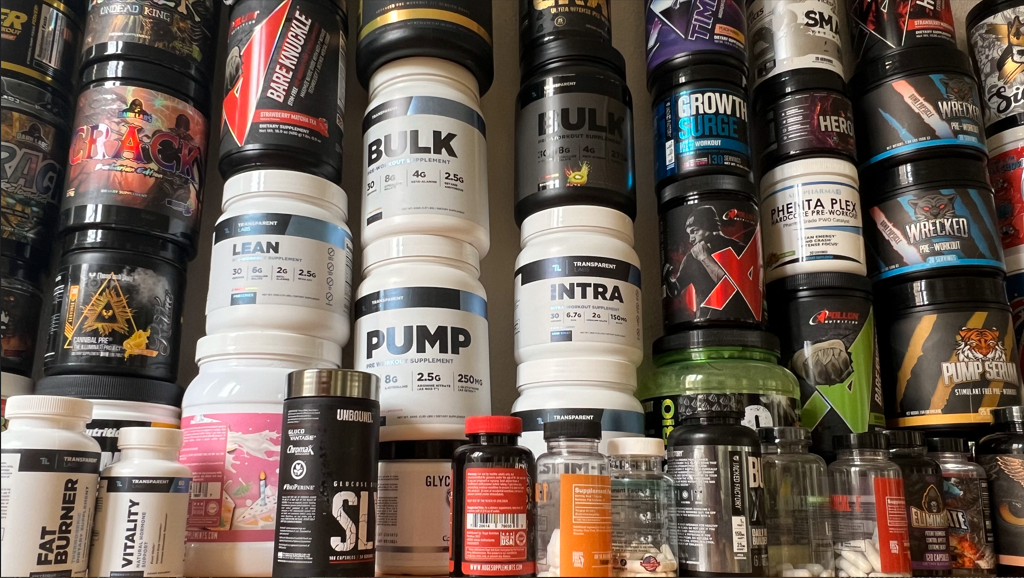
Pre-workout supplements are designed to boost energy and performance during your workout. There are several types:
Stimulant-Based Pre-Workouts: These contain ingredients like caffeine to increase energy and focus.
Non-Stimulant Pre-Workouts: For those sensitive to stimulants, non-stimulant pre-workouts can provide a boost without the jitters. They often contain ingredients like amino acids and beetroot extract to enhance blood flow and endurance.
Pump Pre-Workouts: These are designed to increase blood flow to the muscles during a workout, leading to a better "pump". They often contain ingredients like L-arginine and citrulline malate.
Vegan and Organic Pre-Workouts: For those following a plant-based or organic diet, there are pre-workout options available that align with these dietary preferences.
Muscle building supplements are designed to enhance muscle growth and strength. Here are a few types:
Creatine Monohydrate: This is one of the most researched and effective muscle-building supplements. It works by increasing your muscles' phosphocreatine stores, allowing you to produce more energy during high-intensity exercise.
Beta-Alanine: This amino acid can help fight muscle fatigue by buffering the acid in your muscles during high-intensity exercise.
HMB (Beta-hydroxy beta-methylbutyrate): This is a molecule that's produced when your body processes the amino acid leucine. It can help slow muscle protein breakdown and speed up muscle protein synthesis.
Recommended:
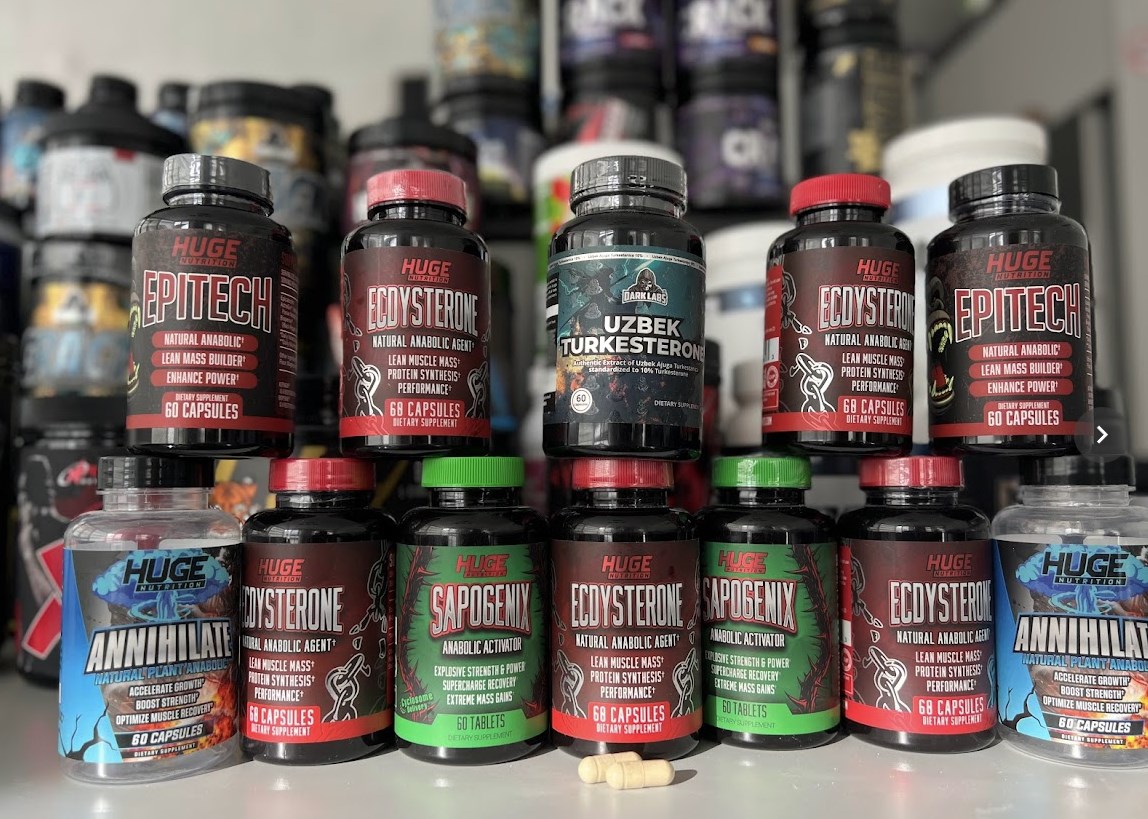
Post-workout supplements are designed to aid recovery after a strenuous workout. Here are a few types:
Whey Protein: As mentioned earlier, whey protein is quickly absorbed by the body, making it a great option for post-workout recovery.
BCAAs (Branched-Chain Amino Acids): These are a group of three essential amino acids: leucine, isoleucine, and valine. They can help reduce muscle soreness and promote muscle protein synthesis.
Glutamine: This is an amino acid that's important for immune function and intestinal health. However, its benefits for muscle growth and athletic performance are not well-supported by scientific evidence.
There are also other supplements that can support your overall health and fitness goals:
Fish Oils: These supplements are rich in omega-3 fatty acids, which have various health benefits, including anti-inflammatory properties that can aid in recovery.
L-Carnitine: This supplement can help improve fat metabolism, reduce fat mass, and increase muscle mass.
Multivitamins: These provide a variety of essential vitamins and minerals to ensure you're meeting your daily nutritional needs.
Each of these supplements serves a unique purpose and can be beneficial depending on your specific goals and needs.
However, it's important to remember that supplements should not replace a balanced diet and regular exercise.
Always consult with a healthcare provider before starting any new supplement.

Timing your supplements can be just as important as choosing the right ones. Here's a quick guide on when to take some of the most common bodybuilding supplements:
Remember, these are general guidelines and the best timing for you may depend on your goals and preferences.
Protein supplements, such as whey protein, are essential for muscle recovery and growth.
They provide a convenient and efficient way to meet daily protein requirements, especially for those who struggle to reach their protein targets through food alone.
They are best-used post-workout to promote muscle protein synthesis and recovery.
This can also include mass gainers.
See: Best Mass Gainers for Sensitive Stomachs
Use Case: Ideal for anyone looking to build muscle mass and improve recovery times.
Pre-workout supplements often contain ingredients like caffeine and beta-alanine to boost energy levels and improve workout performance.
They are designed to be taken before a workout to maximize endurance and focus.
See: Strongest pre-workouts with the highest stims
Use Case: Perfect for those needing an energy boost before hitting the gym, especially those involved in high-intensity workouts.
Creatine is one of the most researched and proven supplements for improving strength, power, and muscle mass. It works by providing increased fuel for our muscles during high-intensity, anaerobic workouts.
Read: Best creatine HCL supplements
Use Case: Great for individuals focusing on strength training and looking to increase their power output.
Fat burners are supplements designed to enhance the body's ability to burn fat stores.
They often contain ingredients like caffeine, green tea extract, and other metabolism-boosting compounds.
Use Case: Suitable for those aiming to lose weight or cut down body fat.
Health supplements encompass a broad range of products designed to support overall health and well-being.
This can include multivitamins, probiotics, omega supplements, joint supplements and other specific nutrients that may be lacking in the diet.
Omega-3 supplements are essential fatty acids that play many important roles in the body, including controlling the inflammatory response, supporting the immune system, and cellular signaling.
See: Best Multivitamins for Bodybuilding
Use Case: Beneficial for general health and wellness, and can also support athletic performance.
Branched-Chain Amino Acids (BCAAs) are a group of three essential amino acids: leucine, isoleucine, and valine.
They are commonly taken in order to boost muscle growth and enhance exercise performance.
Most of the time they are in the form of an "intra-workout" supplement, designed to be consumed during your workouts.
Use Case: Useful for those looking to enhance muscle recovery and reduce exercise fatigue.
See: Best BCAA Supplements without Artificial Sweeteners
Remember, while supplements can provide a convenient way to support your fitness goals, they should not replace a balanced diet and regular exercise.
Always consult with a healthcare professional before starting any new supplement.
Now with the growing demand of coffee blends being mixed with performance-enhancing ingredients, like nootropics and mushrooms, there's a whole new category to consider.
Coffee, or more specifically, the caffeine in coffee, has some serious performance-enhancing benefits.
On the physical side, caffeine is a natural stimulant.
It works by blocking the effects of adenosine, a neurotransmitter that makes you feel tired.
This means you can push harder, lift heavier, and go longer in your workouts.
But that's not all.
Caffeine also enhances the use of fat as fuel.
This means your body can spare its glycogen stores and use fat for energy instead.
The result?
Improved endurance, increased strength, and enhanced power.
But the benefits of coffee don't stop at the physical.
Coffee is also a mental performance booster.
Ever noticed how a cup of coffee can make you feel more alert and focused?
That's the caffeine at work again.
Caffeine can improve various aspects of brain function, including memory, mood, vigilance, energy levels, and reaction times.
This means you can stay focused on your workout, remember your training plan, and react quickly to any challenges that come your way.
So, next time you're about to hit the gym, why not grab a cup of joe first?
It might just give you the edge you need to reach your fitness goals.
But remember, everyone's body is different.
What works for others might not work for you.
So, experiment with different amounts of coffee and see what works best for your body.
And always listen to your body.
If you feel jittery or experience a rapid heartbeat, you might want to cut back.
After all, the goal is to enhance your performance, not hinder it.
Read up our recommended resources here:
Muscle builders are a category of supplements that are designed to support muscle growth and development.
They come in various forms, each with its own unique benefits and potential drawbacks.
Let's go into some of the most popular types of muscle builders: ecdysterone, turkesterone, SARMs, and testosterone boosters.
Resources:
Ecdysterone
Ecdysterone, also known as beta-ecdysterone or 20-hydroxyecdysone, is a naturally occurring steroid hormone that is found in insects, some plants, and some aquatic animals.
See: Ecdysterone vs Turkesterone Supplements
It has been used in traditional medicine for its potential health benefits, and in recent years, it has gained popularity in the bodybuilding community for its potential to enhance muscle growth and performance.
According to various sources, ecdysterone is believed to have anabolic properties, which means it can help increase muscle mass. It is also said to help improve strength and power, making it a popular choice among bodybuilders and athletes.
However, it's important to note that while some users have reported positive results, others question its effectiveness.
Therefore, more research is needed to fully understand its potential benefits and risks.
Turkesterone
Turkesterone is another popular supplement in the bodybuilding community.
It's a type of ecdysteroid, similar to ecdysterone, and is believed to have anabolic properties.
Read what the best turkesterone supplements are.
Turkesterone is said to increase anabolism via estrogen receptor-beta (ERβ) activation and also increases protein synthesis, while inhibiting myostatin and cortisol in the body.
Some users have reported experiencing performance-enhancing benefits without side effects, but as with ecdysterone, more research is needed to confirm these claims.
It's also worth noting that while there are many positive reviews of turkesterone supplements, there are also some who question its effectiveness.
SARMs
Selective Androgen Receptor Modulators (SARMs) are a new generation of anabolic compounds that were synthesized with the intention of being a superior medicine to exogenous testosterone (anabolic steroids).
Read our guide on SARMS.
They have become increasingly popular as a potentially safer and less risky alternative to anabolic steroids amongst performance athletes and bodybuilders.
SARMs work by binding to the androgen receptor, with tissue selectivity, thus potentially offering the benefits of anabolic steroids without the associated risks and side effects.
However, it's important to note that while SARMs may be less harmful than anabolic steroids, they are not without risks and potential side effects.
Testosterone Boosters
Testosterone boosters are supplements designed to naturally increase testosterone levels.
(See: Best Tongkat Ali Supplements)
They are popular among bodybuilders and athletes for their potential to enhance muscle growth, strength, and performance.
Some of the best testosterone boosters are said to maximize natural testosterone levels and support the hardest workouts.
However, it's important to note that while testosterone boosters can provide benefits, they can also have side effects.
The FDA has linked some bodybuilding supplements, as well as products marketed as testosterone alternatives, to adverse effects such as acne and hair loss. Therefore, it's crucial to do your research and consult with a healthcare professional before starting any new supplement regimen.
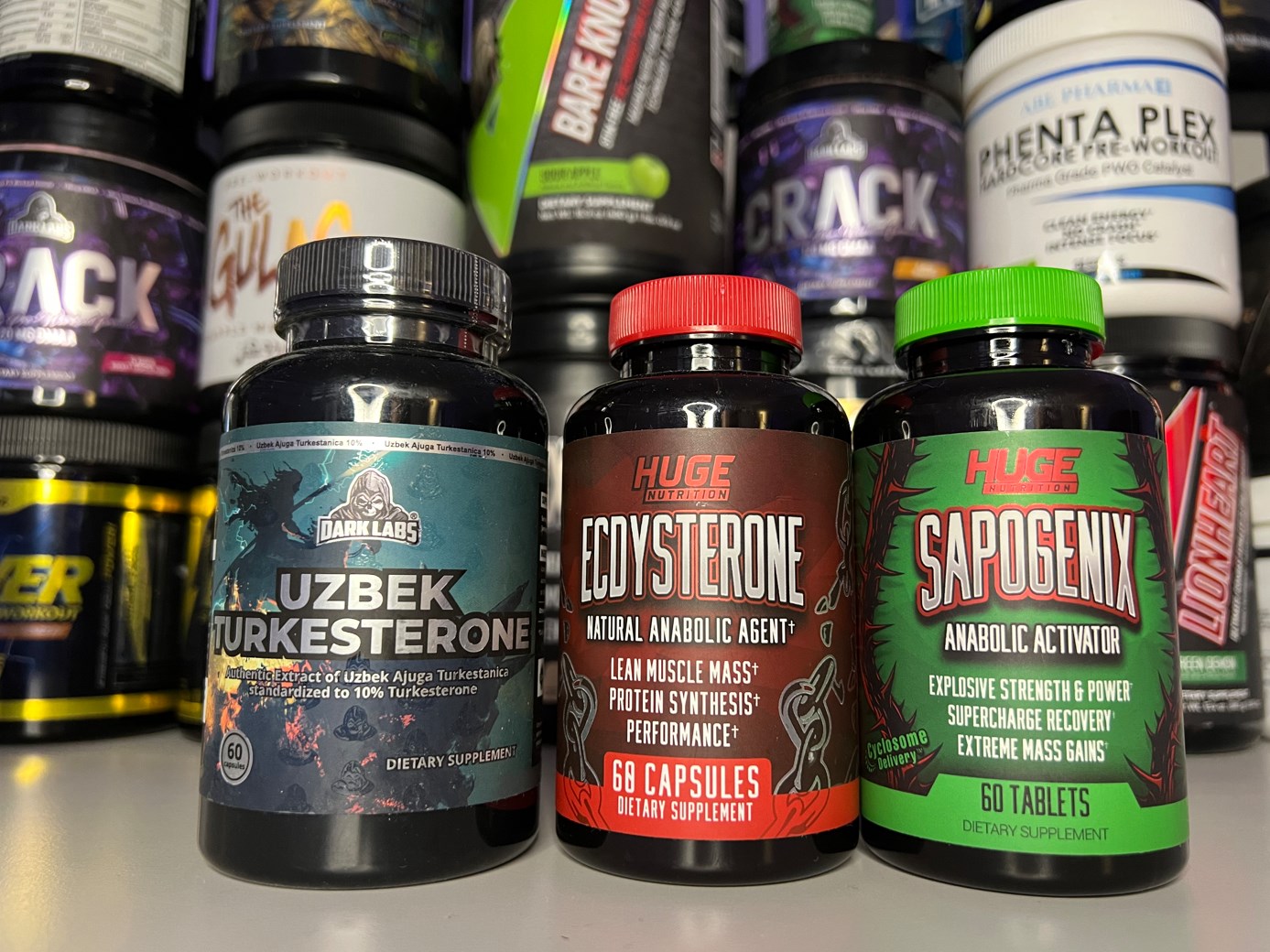
While there are many supplements available on the market, not all are backed by solid scientific evidence.
Here are some of the most scientifically-backed supplements:
Whey Protein: As mentioned earlier, whey protein is a high-quality protein source that promotes muscle protein synthesis and growth. It's a cost-effective and easily digestible method of meeting daily protein allowances.
Creatine Monohydrate: Creatine is one of the most researched supplements for improving strength, power, and muscle mass. It provides increased fuel for our muscles during high-intensity workouts.
Omega-3: Omega-3 fatty acids play many important roles in the body, including controlling the inflammatory response, supporting the immune system, and cellular signaling. They are beneficial for general health and can also support athletic performance.
Caffeine: Caffeine is a well-known stimulant that can improve workout performance by reducing fatigue and increasing focus. It's often found in pre-workout supplements.
Beta-Alanine: Beta-alanine is a nonessential amino acid that helps aid in the production of carnosine. It can delay the "lactic acid burn" that you may feel from high volume sets.
Ingredients such as creatine, caffeine, and citrulline are often highlighted for their potential benefits.
However, it's crucial to understand that these supplements are not solutions, but tools that can complement a balanced diet and rigorous training regimen.
The following studies provide a scientific basis for the effectiveness of these ingredients.
They go into the specifics of how these supplements can enhance performance, offering valuable insights for anyone looking to optimize their bodybuilding journey.
Common Ingredient Profiles of Multi-Ingredient Pre-Workout Supplements: This study analyzed the top 100 commercially available pre-workout supplements for their listed ingredients and amounts. The most common ingredients were beta-alanine, caffeine, citrulline, tyrosine, taurine, and creatine. However, the study found that the average amount of beta-alanine per serving size was below the recommended efficacious dose, and the average caffeine content was near the low end for an effective relative dose for a 70 kg individual.
Nutrition Recommendations for Bodybuilders in the Off-Season: A Narrative Review: This review provides nutrition and dietary supplement recommendations for natural bodybuilders during the off-season phase. It suggests that creatine monohydrate, caffeine, beta-alanine, and citrulline malate might yield ergogenic effects that can be beneficial for bodybuilders.
Use of Metabolomics in Improving Assessment of Dietary Intake: This review discusses the use of metabolomics in measuring diet, which can be complementary to traditional dietary assessment methods. It could be useful in identifying biomarkers of individual foods and dietary patterns.
The effects of six weeks of supplementation with multi-ingredient performance supplements and resistance training on anabolic hormones, body composition, strength, and power in resistance-trained men: This study investigated the impact of specific pre- and post-workout multi-ingredient performance supplements (MIPS) on anabolic hormones, body composition, muscle strength, and power in resistance-trained men participating in a periodized resistance training program. The MIPS used in the study contained whey protein, casein protein, branched-chain amino acids, creatine, and beta alanine. The study concluded that the MIPS enhanced muscle mass and strength gains during resistance training.
"The effects of a pre-workout supplement containing caffeine, creatine, and amino acids during three weeks of high-intensity exercise on aerobic and anaerobic performance": This study examined the effects of a pre-workout supplement containing caffeine, creatine, and amino acids on aerobic and anaerobic performance during three weeks of high-intensity interval training.
"Nutritional Ergogenic Aids in Racquet Sports: A Systematic Review": This systematic review found that acute dosages of caffeine (3–6 mg/kg) 30–60 min before a match can improve specific skills and accuracy. It also suggests that more studies are needed to strengthen the evidence regarding the performance-enhancing effects of creatine, sodium bicarbonate, sodium citrate, beetroot juice, citrulline, and glycerol in racquet sports.
Whey protein stimulates postprandial muscle protein accretion more effectively than do casein and casein hydrolysate in older men: This study compares the postprandial muscle protein accretion after ingestion of whey, casein, and casein hydrolysate in older men. The study concluded that whey protein stimulates postprandial muscle protein accretion more effectively due to a combination of whey’s faster digestion and absorption kinetics and higher leucine content.
"No Significant Differences in Muscle Growth and Strength Development When Consuming Soy and Whey Protein Supplements Matched for Leucine Following a 12 Week Resistance Training Program in Men and Women: A Randomized Trial": This study found that both soy and whey protein supplements, when matched for leucine content, comparably supported strength increases and muscle growth following 12 weeks of resistance training. The study involved 61 untrained young men and women who engaged in supervised resistance training three times a week and consumed either 19 grams of whey protein isolate or 26 grams of soy protein isolate, both containing 2 grams of leucine. The results showed increases in total body mass, lean body mass, and peak torque of leg extensors and flexors in both groups, with no significant differences between the groups.
"Whey protein, amino acids, and vitamin D supplementation with physical activity increases fat-free mass and strength, functionality, and quality of life and decreases inflammation in sarcopenic elderly": This study tested the hypothesis that nutritional supplementation with whey protein (22 g), essential amino acids (10.9 g, including 4 g leucine), and vitamin D [2.5 μg (100 IU)] concurrent with regular, controlled physical activity would increase fat-free mass, strength, physical function, and quality of life, and reduce the risk of malnutrition in sarcopenic elderly persons. The results showed that supplementation plus physical activity increased fat-free mass, relative skeletal muscle mass, android distribution of fat, handgrip strength, standardized summary scores for physical components, activities of daily living, mini nutritional assessment, and insulin-like growth factor I, and lowered C-reactive protein.
The research presented here underscores the potential of ingredients like creatine, caffeine, and citrulline in enhancing athletic performance.
As well as how whey protein can enhance muscle growth.
However, it's important to remember that individual responses to these supplements can vary significantly.
Therefore, while these studies provide a solid foundation, they should not be your source of nutrients.
In the world of bodybuilding, the use of supplements is as common as dumbbells and protein shakes.
But what's the real scoop on their usage?
A study conducted on 500 bodybuilder athletes (250 men and 250 women) from 30 different bodybuilding clubs aimed to shed some light on this topic.
The results? A whopping 49% of the respondents declared supplement use.
Men were more likely to take supplements than women, with a ratio of 86.8% to 11.2%. The reasons for using supplements varied, with 45% reporting health-related issues, 40% aiming to enhance their immune system, and 25% seeking to improve athletic performance.
The Trends in Supplement Usage
The study found that the type of supplement used varied between men and women. Men were more likely to consume creatine products, while women were more likely to take minerals.
During the bulking phase (a systematic attempt to gain muscle and strength), weight gain and anabolic supplements were consumed more frequently by men.
In the cutting phase (removing body fat while trying not to lose muscle), "fat burners" were more commonly consumed by men.
The Influence on Supplement Usage
Interestingly, despite most athletes (72%) having access to a nutritionist, this resource was underutilized.
Coaches (65%) had the greatest influence on supplementation practices, followed by nutritionists (30%) and doctors (25%).
Men were more likely to get information from nutritionists, while women were more likely to rely on family members, friends, physicians, or pharmacists.
What The Study Found
The study concluded that the prevalence of supplement use among bodybuilders was high, with gender, health-related issues, and sports experts being determinant factors of supplement use.
This information can be crucial in developing educational programs for athletes to guide them towards more healthful nutrition practices.
Thought-Provoking Questions
The Role of Coaches and Nutritionists:
Given that coaches had the greatest influence on supplementation practices, how can we ensure that they are adequately educated about the benefits and risks of various supplements?
Gender Differences in Supplement Usage:
What factors contribute to the significant difference in supplement usage between men and women, and how can this information be used to tailor education and guidance about supplement use?
Underutilization of Nutritionists:
Despite most athletes having access to a nutritionist, this resource was underused. What strategies could be implemented to encourage more athletes to seek advice from nutritionists about supplement use?
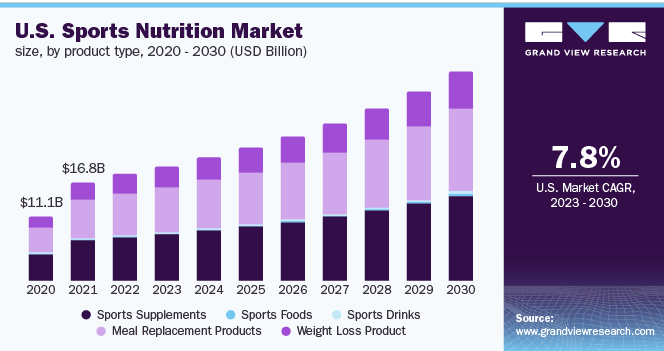
The sports nutrition market is booming, valued at $42.9 billion in 2022 and projected to grow 7.4% annually until 2030.
This surge is driven by the increasing recognition of nutrition's role in performance and the rise of health clubs and fitness centers.
Young consumers are embracing fitness as a lifestyle, fueling the demand for protein supplements.
The trend towards plant-based and immunity-boosting nutritional products is also propelling the market forward.
Interestingly, the COVID-19 pandemic positively impacted the market. Concerns about inactivity and weight gain during lockdowns led to increased consumption of nutritious diets and dietary supplements.
Lastly, the growing prevalence of obesity due to sedentary lifestyles and unhealthy diets has raised awareness about healthy living and nutritious food, further driving the demand for nutritional supplements.
In a nutshell, the sports nutrition market is thriving, shaped by evolving lifestyle trends and health consciousness.
Before we dive into these stats, it's important to note that the supplement industry is a vast and complex landscape.
From the average spending on dietary supplements to the impact of the COVID-19 pandemic on the industry's growth, these statistics offer a glimpse into the current state of the supplement industry.
Now, let's get into these figures and see what they reveal about the trends, behaviors, and economic implications surrounding the world of supplements:
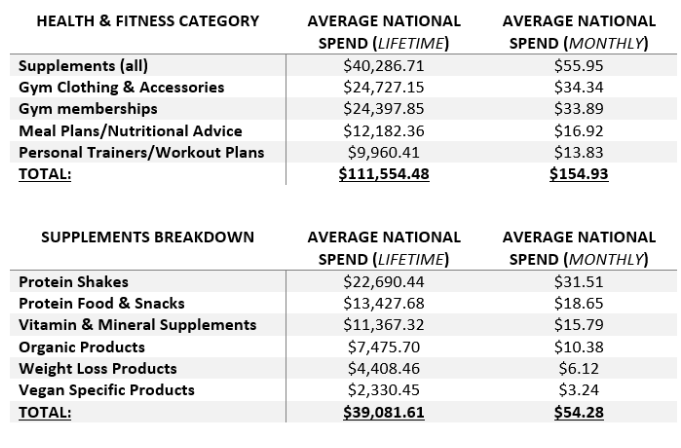
Source: MyProtein Survery
In the world of bodybuilding supplements, reviewers play a significant role.
They are the ones who test out the products, provide their insights, and help consumers make informed decisions.
However, like any other industry, there are both upsides and downsides to supplement reviewers.
On the upside, supplement reviewers provide valuable information about the products.
They test out the supplements, share their experiences, and provide insights that can help consumers make informed decisions.
They can highlight the benefits of a supplement, discuss its effectiveness, and even share any side effects they experienced.
This information can be incredibly helpful for consumers who are trying to decide which supplements to purchase.
However, there are also downsides to supplement reviewers.
One major downside is that some reviewers are paid to promote certain products.
This can lead to biased reviews that don't accurately reflect the effectiveness of the supplement.
Additionally, some reviewers are given a high commission percentage to promote products that have very low manufacturing costs due to underdosing and overmarketing.
This can lead to misleading reviews that overhype the effectiveness of a supplement.
Focus on Quality and Transparency
Today's consumers are more informed than ever and demand quality and transparency from supplement companies.
They want to know exactly what they're putting into their bodies.
This has led to a trend towards clean labels, with companies clearly listing all ingredients and their amounts.
Companies like Transparent Labs are leading the way in this regard.
Rise of Plant-Based Supplements
With the rise of veganism and environmental consciousness, there's been a surge in the popularity of plant-based supplements.
These products cater to those who want to build muscle and enhance performance without consuming animal-derived ingredients.
Personalized Supplements
Another emerging trend is personalized supplements. Companies are now offering products tailored to individual needs based on factors like body type, fitness goals, and genetic makeup.
This approach aims to deliver more effective and efficient results.
Innovative Ingredients and Formulas
The industry is continually researching and experimenting with new ingredients and formulas. For instance, ingredients like turkesterone and ecdysteroids are gaining attention for their potential muscle-building benefits.
Online Retailers
The rise of online retailers has made it easier for consumers to access a wide range of supplements.
Websites like Dark Labs, Muscle Factory SC, and Muscle Players offer a variety of products and ship worldwide.
These platforms often provide detailed product information, reviews, and customer service to help consumers make informed choices.
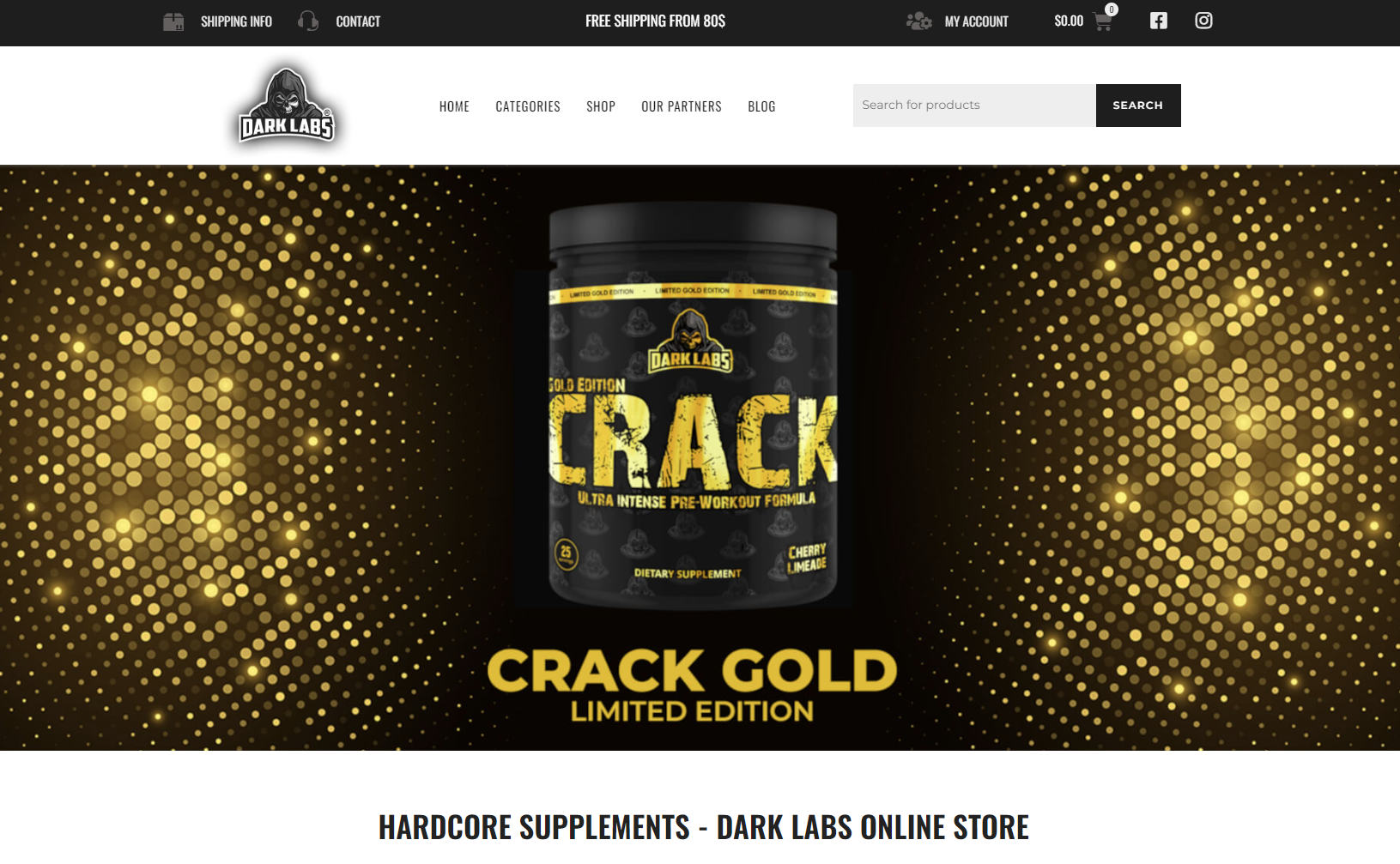
In the world of bodybuilding supplements, where you buy your products matters. Here are a few trusted online retailers known for their quality products and customer service:
Dark Labs: Ships from the USA, UK, and Poland to various countries. They offer a 10% discount with the code FITFREK. Visit Dark Labs
Muscle Factory SC: Based in the USA and ships worldwide. They offer a 15% discount with the code FITFREK. Visit Muscle Factory SC
Muscle Players: Ships from the USA to the USA, Canada, and the UK. They offer a 15% off discount code with FITFREK. Visit Muscle Players
My Supplement Plug: Based in the USA and ships worldwide. They offer a 15% discount with the code FITFREK. Visit My Supplement Plug
Nutri Cartel: Based in the USA and ships worldwide. They offer a 15% discount with the code FITFREK. Visit Nutri Cartel
Nutrition Faktory: Based in the USA and ships worldwide. Visit Nutrition Faktory
Ruesco: Based in the USA and ships worldwide. Use discount code FITFREK. Visit Ruesco
Supp Kingz: Based in the USA and ships worldwide. They offer a 15% discount with the code FITFREK. Visit Supp Kingz
Supps Central: Based in the USA and ships worldwide. They offer a 15% discount with the code FITFREK. Visit Supps Central
Cross the Limits: Based in the UK and ships to Europe. Visit Cross the Limits
Gym Sanctuary: Based in Poland and ships worldwide. Visit Gym Sanctuary
WXN Labs: Based in Poland and ships worldwide. Visit WXN Labs
American Muscle Fit: Based in Spain and ships to various European countries. Visit American Muscle Fit
Stay Focused: Based in Germany. Visit Stay Focused
American Supplements: Based in Slovakia and ships to Europe. Visit American Supplements
Nutritional Supplement Shop: A trusted online retailer offering a wide range of bodybuilding supplements. Visit Nutritional Supplement Shop
Huge Supplements: Known for their comprehensive range of bodybuilding supplements, from pre-workouts to fat burners. Visit Huge Supplements
Transparent Labs: As the name suggests, this retailer is known for their commitment to transparency, providing clear and detailed information about the ingredients in their supplements. Visit Transparent Labs
What are bodybuilding supplements?
Bodybuilding supplements are products designed to enhance the growth and performance of the body's muscles. They often contain a variety of ingredients, such as proteins, amino acids, vitamins, and minerals, that are intended to improve workout performance, stimulate muscle growth, and aid in recovery.
Are bodybuilding supplements necessary?
While bodybuilding supplements can provide a convenient way to get extra nutrients, they are not a replacement for a balanced diet. The foundation of your success will always be your nutrition, training, and recovery. Supplements may bring you a few extra percent of improvement, but they are a supplement to your nutrition and training regimen, not the core of it.
What are the best supplements for beginners in bodybuilding?
For beginners, the most recommended supplements are whey protein, creatine, multivitamins, and fish oil. These supplements help in muscle recovery, strength improvement, and overall health maintenance.
How much protein should I take?
The amount of protein you should take depends on your body weight and your fitness goals. Generally, it's recommended to consume 20-30 grams of protein per serving post-workout. If you weigh more than 200 pounds, you might need a slightly higher amount.
When should I take creatine?
Creatine can be taken pre and post-workout. You can start with a maintenance dose of 3 to 5 grams per day. Some people prefer a "loading phase" where they take 20 grams of creatine per day for 5-7 days, then switch to the maintenance dose.
What is the benefit of fish oil supplements?
Fish oil supplements are high in omega-3 fatty acids, which are essential for reducing inflammation in the body. They can help improve heart health and support performance and recovery from training.
Do I need a multivitamin?
While a balanced diet should provide all the necessary vitamins and minerals, a multivitamin can act as a safety net, ensuring you get the necessary nutrients, especially if your diet lacks variety.
What is the role of Vitamin D3 in bodybuilding?
Vitamin D3 is crucial for bone health, immune function, and inflammation control. It can also help improve muscle strength. If you spend a lot of time indoors and don't get much sun exposure, supplementing with Vitamin D3 can be beneficial.
What are some recommended bodybuilding supplements?
Some of the most commonly recommended bodybuilding supplements include protein powders, creatine, branched-chain amino acids (BCAAs), and multivitamins. However, the effectiveness of these supplements can vary depending on the individual and their specific goals.
How do I choose a protein supplement?
When choosing a protein supplement, look for minimal processing, a combination of multiple sources of plant proteins, and organic or raw ingredients. This will ensure that the product is as nutritious as possible and has a broad spectrum of amino acids.
What is the role of a multivitamin in bodybuilding?
A multivitamin/multimineral supplement can help ensure that you're getting the necessary vitamins and minerals needed for optimal body function. While these micronutrients don't directly enhance athletic performance, they're necessary to achieve optimal levels of performance.
Are there any bodybuilding supplements to avoid?
Yes, not all bodybuilding supplements are beneficial. Some may contain harmful ingredients or may not have enough scientific evidence to support their effectiveness. It's always important to do your research and consult with a healthcare professional before starting any new supplement regimen.
Where can I buy bodybuilding supplements?
Bodybuilding supplements can be purchased from a variety of online and physical retailers. Some popular online retailers include Dark Labs, Muscle Factory SC, Muscle Players, My Supplement Plug, Nutri Cartel, Nutrition Faktory, Ruesco, Supp Kingz, Supps Central, Cross the Limits, Gym Sanctuary, WXN Labs, American Muscle Fit, Stay Focused, American Supplements, Nutritional Supplement Shop, Huge Supplements, and Transparent Labs.
What are the current trends in the bodybuilding supplement market?
The bodybuilding supplement market is constantly evolving, with new products and trends emerging all the time. Some current trends include the rise of plant-based and vegan supplements, the increased focus on natural and organic ingredients, and the growing popularity of personalized or "custom" supplements.
What is the future of bodybuilding supplements?
The future of bodybuilding supplements looks promising, with advancements in science and technology leading to the development of more effective and safer products. Personalized nutrition, where supplements are tailored to an individual's specific needs and goals, is also expected to become more prevalent.
What are some common misconceptions about bodybuilding supplements?
Some common misconceptions about bodybuilding supplements include the belief that they're a quick fix for gaining muscle, that they're only for serious athletes, or that they can replace a balanced diet. It's important to understand that supplements are just that - a supplement to a healthy diet and regular exercise regimen.
Bodybuilding supplements have come a long way.
From humble beginnings with natural foods to the vast array of products available today, they've become an integral part of the bodybuilding journey.
They offer a convenient way to support your training, fill nutritional gaps, and maximize your performance and results.
However, it's important to remember that supplements are just that - a supplement to a balanced diet and rigorous training program.
They're not a magic solution, but with the right approach, they can help you reach your bodybuilding goals.
So, whether you're a seasoned bodybuilder or just starting out, consider how supplements could fit into your routine.
And remember, always choose quality products from reputable companies.
For more information on supplements, check out our comprehensive guides on various types, including a detailed guide on pre-workouts.
These resources can help you make informed decisions and choose the right supplements for your needs
Useful Links
 About FitFrek
About FitFrekFitFrek operates as an independent platform, offering comprehensive workouts, programs, routines, guides, and unbiased reviews to accelerate your progress. We pride ourselves on our honesty, delivering straightforward and candid insights. FitFrek does not offer medical advice, diagnosis, or treatment services.